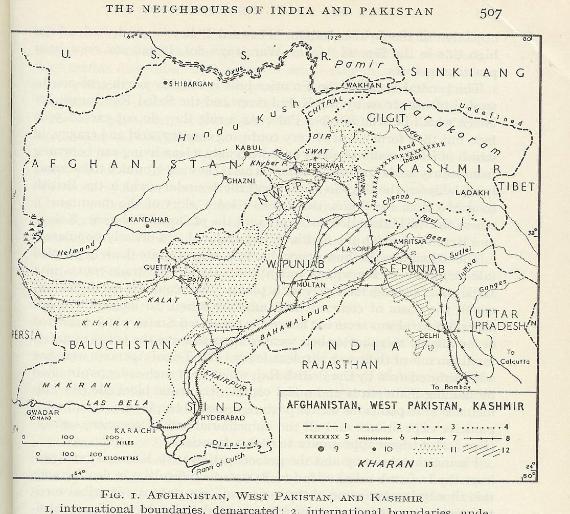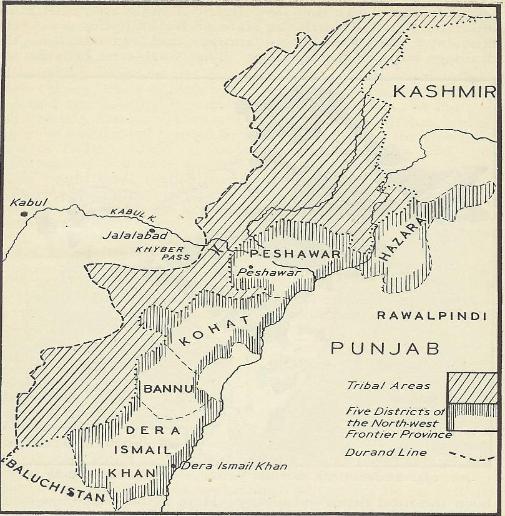
| KHYBER--PASS |
| " The Frontier " of the old Indian empire was simply that on the North-West and more especially that with Afghanistan : all of it has been inherited by Pakitstan. The boundary with Iran does not at PRESENT raise any special problems , although, of course, an extension of Russian influence into the old British sphere of Southern Iran would do so at once. ( not to forget what Iran stold from Russia when they changed from Persia to Iran around ww II) Along its northern border Baluchistan marches with Afghanistan, but here the border districts were under direct British rule . But in the North- west Frontier Provience the administered areas lie back from the Afghan boundary (the Durand line , in part undemarcated), and tribal movement, raiding or refugee, across the border is little impeded. This frontier is very much alive; probably completely effective policing could be obtained only by a single political control of both sides of the quadrilateral Quetta-Peshawar-Kabul-Kandahar. This was the objective of the British Indian " Forward Policy ," which had a brief high tide in the Second Afghan War (1878-80); it has not since been practical politics. EAST GORDON W, MOODIE A E . THE CHANGING WORLD STUDIES IN POLITICAL GEOGRAPHY. WORLD BOOK COMPANY YONKERS ON THE HUDSON NEW YORK;1956.PG 506-508. |

India and Pakistan raise more problems of political geography than can possibly be
touched on here. They may be summarized as:
Frontier problems.
Problems of internal organization and political development.
Problems of over-population and economic development.
Discussion of these is necessarily summary in the extreme. India is a 'continent' little smaller than Western Europe,
with' a population approaching 400,000,000, 222 vernacular languages, and climates ranging from tropical jungle to
desert. . India is well defined by mountains and sea. The mountain frontier, however, is no. hard and fast line,
predestined by nature to set bounds to India. The plain merges into hills and these into the higher ranges, which lie one
behind the other. In the east the frontier follows a belt of tangled mountain country, which was thought impassable until
the Burma Campaign of 1944-45. At very few points does the northern frontier follow the watershed of the Himalaya.
The southern slopes of the range are occupied in part by the independent state of Nepal and the state of Bhutan,
whose relations with the Government of India are rather more intimate. On the north the state of Kashmir lies across
the Himalaya and Karakorum ranges, and extends into the. drainage basin of the Sinkiang. The North-west Frontier
has been the most disturbed of any. Here is the chief land-route,the Khyber Pass, into India, and most of India's
invaders have come from this direction. The possibility of attack from Russia or Persia; combined with the actual threat
from the Pathan tribesmen, has focused attention on this quarter. The British inherited from the Sikhs an almost
indefensible frontier in the Indus plain. This is roughly the frontier of British India, but a 'forward policy' was initiated
of extending British influence over "that part, of the Border where anarchy, murder and robbery up to the present time
have reigned supreme." The result was the creation of the Durand Line (1895), further advanced into Pathan territory,
as a purdy military frontier. The territory, some 25,000 square miles, between the Durand Line and the political frontier
of India, comprises the Northwest Frontier Province, contains some 3 million Pathans, and is subject to a degree of
control by_Political Agents of the Government of India. Many advocate a stronger policy and the institution of complete
control over the tribal areas, while others would limit British interference to a minimum. Baluchistan,to the south, a large
semi-desert and mountainous tract, is wholly occupied by British and Indian forces. Both the North-west Frontier and
Baluchistan are areas of tribal unrest, which constitutes a threat to Indian security and a heavy burden on the Indian
Government.
touched on here. They may be summarized as:
Frontier problems.
Problems of internal organization and political development.
Problems of over-population and economic development.
Discussion of these is necessarily summary in the extreme. India is a 'continent' little smaller than Western Europe,
with' a population approaching 400,000,000, 222 vernacular languages, and climates ranging from tropical jungle to
desert. . India is well defined by mountains and sea. The mountain frontier, however, is no. hard and fast line,
predestined by nature to set bounds to India. The plain merges into hills and these into the higher ranges, which lie one
behind the other. In the east the frontier follows a belt of tangled mountain country, which was thought impassable until
the Burma Campaign of 1944-45. At very few points does the northern frontier follow the watershed of the Himalaya.
The southern slopes of the range are occupied in part by the independent state of Nepal and the state of Bhutan,
whose relations with the Government of India are rather more intimate. On the north the state of Kashmir lies across
the Himalaya and Karakorum ranges, and extends into the. drainage basin of the Sinkiang. The North-west Frontier
has been the most disturbed of any. Here is the chief land-route,the Khyber Pass, into India, and most of India's
invaders have come from this direction. The possibility of attack from Russia or Persia; combined with the actual threat
from the Pathan tribesmen, has focused attention on this quarter. The British inherited from the Sikhs an almost
indefensible frontier in the Indus plain. This is roughly the frontier of British India, but a 'forward policy' was initiated
of extending British influence over "that part, of the Border where anarchy, murder and robbery up to the present time
have reigned supreme." The result was the creation of the Durand Line (1895), further advanced into Pathan territory,
as a purdy military frontier. The territory, some 25,000 square miles, between the Durand Line and the political frontier
of India, comprises the Northwest Frontier Province, contains some 3 million Pathans, and is subject to a degree of
control by_Political Agents of the Government of India. Many advocate a stronger policy and the institution of complete
control over the tribal areas, while others would limit British interference to a minimum. Baluchistan,to the south, a large
semi-desert and mountainous tract, is wholly occupied by British and Indian forces. Both the North-west Frontier and
Baluchistan are areas of tribal unrest, which constitutes a threat to Indian security and a heavy burden on the Indian
Government.
